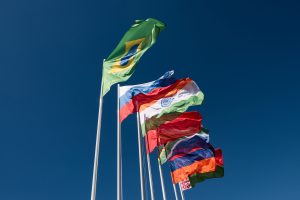Bangkok recently stepped into the long queue of 15 countries planning to join BRICS, an international organization founded by Brazil, Russia, India, China, and South Africa. Even though Thailand is the first Southeast Asian country to request admission, it is part of a larger group countries that have been invited to join: Egypt, Ethiopia, Iran, and the UAE all became full members on January 1, 2024, and Saudi Arabia is not far behind. Regional powerhouses in their own right, these countries become a formidable economic force when taken together. These memberships underscore the vision of BRICS as a Global South community that rivals the global political and economic sway of the West – an effort that Beijing espouses itself to be the leader of.
China’s state-owned Global Times painted Bangkok’s bid as a sign that the Thai people “are no longer interested in accepting U.S. currency for payment,” implicitly referring to burgeoning efforts in creating a BRICS currency as a rival to the dollar. RT cut even straighter to the point, arguing that Bangkok sees its future in a multipolar world. These developments take place as Thailand-U.S. relations languish. China is becoming an increasingly important security partner for Thailand and its largest investor and trading partner.
But celebrations from China and other BRICS founders may be premature. While Thailand certainly understands the importance of multilateralism and the growing role of the Global South in world politics, its application to join BRICS is not a sign that it is pursuing development that diverges from the U.S.-led international order. Instead, the bid is evidence of Thailand’s strength in maximizing strategic space. Prime Minister Srettha Thavisin is straightforward in stating his intention for rapprochement with the United States, but doing so without compromising the country’s close ties with China. This vision of diversifying global sources of growth is clear in Thailand’s recent economic and foreign policy decisions.
Bangkok remains active in the U.S.-led Indo-Pacific Economic Framework and is eagerly looking to capture investment from U.S. semiconductor firms diversifying production from China to Southeast Asia, as promised by U.S. Commerce Secretary Gina Raimondo. Concurrently, Bangkok and Washington continue to cooperate closely on military exercises, and at a far larger and frequent scale than those with China. At the same time as its BRICS bid, Thailand is seeking Organization for Economic Cooperation and Development (OECD) membership and has secured support from Germany.
These actions do not suggest a Thailand isolated from the U.S. and drifting closer to Beijing’s sphere of influence, but rather a pragmatic and flexible administration looking to hedge its bets in multiple places. After all, BRICS membership does not come with any perceived costs (yet) – continued division in the BRICS and dim hopes for a usable BRICS currency mean that Thailand does not have to commit to any stark policy changes that would affect investor sentiment. All the while, Thailand can continue to reap the economic benefits of aligning itself with both the Global South and the West.
Thailand understands and recognizes the utility of multilateralism, just not in the way BRICS principles envision. By retaining a breadth of options, Thailand’s BRICS bid shows that the country can have its cake and eat it too.

































